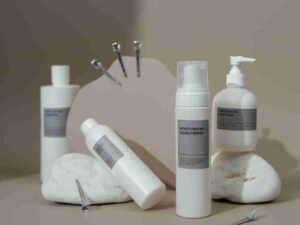Confused about the difference between private label and contract manufacturing for your business? With so many options available, it can be hard to know which one is the best fit for your company.
Private label manufacturing allows you to have control over the design and packaging. Also the branding of the product under your own brand name. while contract manufacturing means that the product will be sold under the manufacturer. In this article, we will cover the main distinctions between these two manufacturing types and how they can impact your business.
So read on! To gain a deeper understanding of private label and contract manufacturing. And make an informed decision for your business.
1. Cosmetics Industry: The Basics of Private Label and Contract Manufacturing
Private Label Manufacturing
Private label manufacturing involves working with a manufacturer to produce products. Which are then sold under your own brand name. This allows you to have complete control over the design, and branding of the product. while the manufacturer handles the production process. This can be a great option for businesses that want to create a unique brand image. And differentiate themselves in the market.

Contract Manufacturing
Contract manufacturing involves hiring a manufacturer. To produce products to your specifications. But they will be sold under the manufacturer’s brand name. This can be a cost-effective option for businesses that want to enter the market quickly. But don’t want to invest in their own production facilities. Also, it.can give your business access to a manufacturer’s existing distribution channels.
In summary, private label manufacturing gives you greater control over the product. And also have the ability to build your own brand. while contract manufacturing is more cost-effective. And can provide access to existing distribution channels. Both methods have their own pros and cons. So I suggest carefully consider your business goals, budget, and target market. When deciding which method is best for your company.

2. Cosmetic Private Label Manufacturing
How Private Labeling Manufacturing Works
Cosmetic private labeling manufacturing is the process where a manufacturer produces cosmetic products. Such as skincare, hair care, and makeup products for a company that will then put its own branding and labeling on the products and sell them as if they were their own.
The company will provide the manufacturer with its own specifications for the product. Such as packaging, labeling, ingredients, and branding. And the manufacturer will produce the cosmetic products according to those specifications. The company may also have the option to customize the formula. Or they will have it developed according to its desired ingredients.
The manufacturer will handle all the necessary regulatory compliance and testing. While the company can focus on marketing and selling the products under its own brand name. This allows the company to create and sell cosmetic products under its own brand name. Without the need for investing in R&D, manufacturing facilities, or inventory. And also to have more control over the image and reputation of its brand.

Advantages
Cost Savings
By using private-label manufacturing. A company can avoid the significant costs associated with researching. and Also developing new cosmetic products. As well as the costs of maintaining manufacturing facilities and inventory.
Faster Time To Market
Private label manufacturers typically have existing production lines. And processes in place, which can allow a company to get new cosmetic products. To market more quickly than if they were developing the products in-house.
Increased Flexibility
Private-label manufacturing allows a company to adapt to changes in consumer demand. And also the market conditions. As they can work with their manufacturer to adjust production or create new products. I suggest that private-label manufacturing can provide a company with greater flexibility. In terms of product development and production. Which can be beneficial in a rapidly changing market.
Brand Control
By creating its own branded cosmetic products. A company can have more control over the image and reputation of its brand. And can differentiate its products from its competitors.
Quality Control
Private label manufacturers often have extensive experience. And expertise in producing high-quality cosmetic products. Allowing the company to enjoy its knowledge and experience. At Nako Cosmetic, we understand the importance of customization. And take pride in working closely with our clients. To create unique and effective products that stand out in the market.
Regulatory Compliance and Testing
Private label manufacturers will handle all necessary regulatory compliance. And also testing cosmetic products. Which can be a complex and time-consuming process for companies to handle on their own.
Lower Minimum Order Quantity
Private label manufacturers often have lower minimum order quantities than original equipment manufacturers. Which can be beneficial for small businesses or companies. That wish to test the market before committing to large orders.
Customization
Private label manufacturers can offer customization of the formula. And also the ingredients of cosmetic products. To suit the company’s desired results or target market.

Disadvantages
Limited Control Over Production
A company may have less control over the production process. when using a private label manufacturer. Which can make it more difficult to ensure consistent quality. Or compliance with regulations set by FDA.

Dependence on the Manufacturer
A company may become overly dependent on the private label manufacturer. Which can make it difficult to change manufacturers. Or to switch to in-house production if needed.
Potential Loss of Brand Identity
If a company is not careful with its branding and packaging. Its private-label cosmetic products may look too similar to those of its competitors. Which can make it difficult to stand out in the market.
Limited Innovation
When using private-label manufacturing. Companies may not have the possibility to innovate and create new formulas. Also, change ingredients or packaging that can set them apart from the competition.

3. Cosmetic Contract Manufacturing
How Contract Manufacturing Works
Cosmetic contract manufacturing is the process where a company hires a third-party manufacturer. Tto produce cosmetic products on its behalf. The company will provide the manufacturer with the formula, ingredients, and packaging. And also branding specifications for the product. They will then produce the products according to those specifications. And will handle all necessary regulatory compliance and testing.
The company will then purchase the finished products from the manufacturer. And then sell them under its own brand name. This allows the company to outsource the production process. While still maintaining control over the design, formulation, and branding of the product. The contract manufacturer has specialized equipment and expertise in producing cosmetic products. Ensuring high quality and consistency in products.
Cosmetic contract manufacturing can be a cost-effective way to enter a new market. I would recommend this to companies looking to enter a new market or expand their product line. As it allows them to quickly and efficiently bring new products to market. Without incurring the significant costs associated with creating products from scratch.
This video offers advice on finding and working with a contract manufacturer for your beauty brand, covering topics such as selecting the right manufacturer, negotiating contracts, and ensuring product quality.
Advantages
The global personal care contract manufacturing market size was estimated at USD 18.80 billion in 2021 and is anticipated to expand at a compound annual growth rate (CAGR) of 8.1% from 2022 to 2030. Hence, the following advantages below:
Cost Savings
By outsourcing production to a contract manufacturer. A company can avoid the significant costs associated with maintaining manufacturing facilities. Also, avoid equipment, and inventory costs.
Access to Specialized Expertise
Cosmetic contract manufacturers typically have specialized equipment and expertise in producing cosmetic products. Which can help ensure high quality and consistency in the finished products.
Flexibility
Cosmetic contract manufacturing allows a company to adapt to changes in consumer demand. And also to the market conditions. As they can work with their manufacturer to adjust production or create new products.
Brand Control
By creating its own branded cosmetic products. A company can have more control over the image and reputation of its brand. And can differentiate its products from its competitors.
Quality Control
Cosmetic contract manufacturers often have extensive experience. And expertise in producing high-quality cosmetic products. Allowing the company to benefit from their knowledge and experience. At Nako Cosmetic, we also have a strong focus on quality assurance and control. We have strict protocols in place. To ensure that all of our products meet the highest standards for safety.
Regulatory Compliance and Testing
Cosmetic contract manufacturers will handle all necessary regulatory compliance. And also testing cosmetic products. Which can be a complex and time-consuming process for companies to handle on their own.
Customization
Cosmetic contract manufacturers can offer customization of the formula. Or the ingredients of cosmetic products. To suit the company’s desired results or target market.
Reduced Risks
By working with a contract manufacturer. The company does not need to invest in the production facility and employees. Thus reducing the risks associated with those investments.

Disadvantages
Limited Control Over Production
While companies have more control over the production process when using contract manufacturing. They may still have to rely on the manufacturer. To produce the product according to their specifications.
Dependence on the Manufacturer
A company may become overly dependent on the contract manufacturer. Which can make it difficult to change manufacturers. Or to switch to in-house production if needed.
Higher Costs
While contract manufacturing can save costs in some areas. It may be more expensive than in-house manufacturing in other areas. Such as transportation costs and minimum order quantities. According to the industry data. Contract manufacturing can often save companies up to 30-40% on production costs. Compared to in-house manufacturing.
Limited Scalability
Companies may face limitations when it comes to scaling their production. As they are dependent on the capacity and capability of the contract manufacturer. For example, if your business experiences a sudden increase in demand for a product. Your manufacturer may not have the capacity to increase production quickly. Which leads to delays in fulfilling orders and potential loss of sales.
Communication and Coordination
Companies may face challenges in coordinating and communicating with the contract manufacturer. To ensure that they meet the required standards, specifications, and timelines.

4. Comparison of Private Label and Contract Manufacturing
Key Differences
Ownership of the Product
In private-label manufacturing. The manufacturer produces the product and the company puts its own branding. And labeling on it to sell it as if it were their own product. In contract manufacturing, the company provides the formula, ingredients, and packaging. And also branding specifications for the manufacturer. and they produce the product, but the company owns the product and the brand.

Branding and Labeling
In private-label manufacturing. The company will provide the manufacturer with its own branding and labeling specifications. Ad the manufacturer will produce the product according to those specifications. In contract manufacturing, the company will own the brand. And they will also handle the branding and labeling of the product themselves.

Customization
Private label manufacturers may offer some level of customization. but it is often limited to packaging, labeling, and branding. In contract manufacturing. The company has more control over the customization of the formula. Also, the ingredients, and the final product.

Product Differentiation
In private-label manufacturing. The company may have limited ability to differentiate its products from its competitors. As they are using the same manufacturer and ingredients as other companies. In contract manufacturing, the company has more control over product differentiation. This is by creating unique formulations, ingredients, and branding.

Innovation
Private-label manufacturing may not allow for much innovation. As they work with pre-existing formulas and ingredients. In contract manufacturing, the company has more control over the formulation and ingredients. Giving them more room for innovation.

Key Similarities
Outsourced Production
Both private label and contract manufacturing involve outsourcing the production of cosmetic products.

Cost Savings
Both private label and contract manufacturing can save a company significant costs. Costs associated with researching and developing new products. As well as the costs of maintaining manufacturing facilities and inventory.

Faster Time to Market
Both manufacturers have existing production lines and processes in place. This can allow a company to get new products to market. More than if they were developing the products in-house.

Quality Control
Both private label and contract manufacturers often have extensive experience. And also have expertise in producing high-quality cosmetic products. Allowing the company to benefit from their knowledge and experience.

Regulatory Compliance and Testing
Both private label and contract manufacturers will handle all necessary regulatory compliance. Also the testing for cosmetic products. Which can be a complex and time-consuming process for companies to handle on their own.

Customization
Both private label and contract manufacturers offer customization of the formula. Or the ingredients of cosmetic products. To suit the company’s desired results or target market. I suggest that companies take advantage of the customization options. Which is offered by private-label and contract manufacturers. To create products that are tailored to their target market. And align with their overall brand strategy.

Branding and Labeling
Both private label and contract manufacturing may involve the company’s own branding. And also labeling on the final product.

5. Which Manufacturing Process Fits Your Business Most?
It is important to consider which manufacturing process fits your business the best. Both private label and contract manufacturing have their own advantages and disadvantages. And the decision will depend on the specific needs and goals of your business.
If your company is looking to enter a new market. Or expand your product line quickly and cost-effectively. Then I will recommend private label manufacturing may be the best option. This allows you to put your own branding and labeling on pre-existing products. and get them to market quickly. Without the need for significant investment in research and development.
On the other hand, if your company is looking to maintain control over the production process. And have more control over the ingredients, formulation, and branding of your products. Then, contract manufacturing may be the best fit. This allows you to provide the manufacturer with your own product specifications. And they will produce it according to those specifications.
Ultimately, the choice between private label and contract manufacturing varies. This will depend on your company’s needs, goals, and resources. It may be helpful to consult with experts in both fields and weigh the pros and cons of each option. To determine which process will best suit your business.
In this table, we’ll compare Private Label vs Contract Manufacturing and explore which manufacturing process may fit your business best, based on various criteria such as customization, control over production, time to market, and cost.
| Criteria |
Private Label Manufacturing |
Contract Manufacturing |
| Ownership of the Product |
The manufacturer produces the product and the business owns the brand and controls the marketing and distribution. |
The manufacturer produces the product for another business and does not have ownership of the brand or distribution. |
| Customization |
The business can customize the product to its specific requirements, including packaging, labeling, and ingredients. |
The manufacturer may have limitations on customization, depending on their production capabilities and processes. |
| Control over Production |
The business has control over the production process and quality control. |
The manufacturer is responsible for production and quality control. |
| Investment Required |
The business needs to invest in developing and marketing the product, but does not need to invest in manufacturing equipment or facilities. |
The manufacturer invests in the manufacturing equipment and facilities, but may require the business to make a minimum order quantity or pay a set-up fee. |
| Time to Market |
Private label manufacturing may allow for faster time to market since the product does not need to be developed from scratch. |
Contract manufacturing may take longer to bring a product to market since the manufacturer needs to develop the product to the business’s specifications. |
| Volume Flexibility |
Private label manufacturing may allow for flexibility in production volume since the business can order smaller quantities. |
Contract manufacturing may require a minimum order quantity, which may limit volume flexibility. |
| Cost |
Private label manufacturing may be more cost-effective for the business since the manufacturer is not responsible for marketing and distribution costs. |
Contract manufacturing may be more expensive since the manufacturer is responsible for production costs and may require a set-up fee. |
Note that the criteria listed above are generalizations and may not apply to all businesses or manufacturing arrangements.
Dive Deeper Into Our Resources
For some insightful reads, we’ve curated a list of recommended articles just for you:
Still haven’t found what you’re looking for? Don’t hesitate to contact us. We’re available around the clock to assist you.
6. Conclusion
In conclusion, private label and contract manufacturing are two distinct options for companies. Which are looking to produce and sell their own cosmetic products. Both options have their own unique advantages. And choosing between them depends on the company’s specific needs and goals. So if you are looking to enter the cosmetic market. Evaluate your options and determine which approach best aligns with your business objectives.
If you are unsure which option is the best fit for your business, don’t hesitate to contact us. Our team of experts is always happy to answer any questions you may have. And provide guidance on the best approach for your specific needs.



















